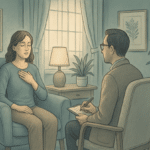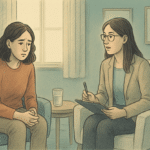Healing From Sexual Abuse: Seeking Support

Anyone can experience sexual abuse. Any age, gender, or sexual orientation. If you have experienced sexual abuse, it is important to remember that it was not your fault.
Sexual abuse is a crime. This is true regardless of who committed it. Even if you said yes in the past, consent can be withdrawn at any time.
Sexual violence continues to be a major health problem in the United States. Whilst anyone can be a victim of sexual abuse, it is sadly true that certain individuals are more vulnerable to sexual abuse. Women and girls are at a particularly high risk.
1 in 5 women in the US have been the victim of an attempted rape or completed rape in their lifetime, and 43% of men have experienced sexual assault or harrassment.1,2 So, if you or someone you know has suffered sexual abuse, know that you’re not alone. And know that you can recover.
On this page, we will discuss:
How to recognize sexual abuse
- The effects of sexual trauma
- Treatment options for sexual abuse survivors
- Tips on how to recover from sexual abuse

What Is Sexual Abuse?
The World Health Organization (WHO) defines sexual abuse as: ‘Actual or threatened physical intrusion of a sexual nature, whether by force or under unequal or coercive conditions.’3
Any sexual act that is carried out through force, or the threat of force, is sexual abuse, and as such is a criminal offence. This is true regardless of whether you know the person or not. Sexual abuse involves any sexual act where consent was not given, or where someone has not been able to give consent.
The following are examples of sexual abuse:
Any type of sexually unwanted contact, where no consent has been given. For example, someone who is underage, has a mental or physical disability, or someone who is intoxicated
- Rape, attempted rape, or sexual assault
- Non-consensual sexual penetration or attempted penetration
- Any sexual contact with a child
- Sexual contact between family members (incest)
- Inappropriate teasing, or harassment
- Indecent exposure
- Fondling or any unwanted inappropriate touch
- Forced use of pornography or being forced to watch sexual acts
What’s the Difference Between Sexual Abuse and Sexual Assault?
Sexual assault involves any threatening, violent, and unwanted sexual behavior where a person has not given consent, or the person was unable to give consent. Sexual assault is used as a term usually to describe a single, one-off event. Sexual abuse, on the other hand, refers to sexually abusive acts carried out over a longer period of time.
Signs of Sexual Abuse in Adults
Sexual abuse differs for everyone who experiences it. With this in mind, the signs of sexual abuse may be drastically different from person to person. Nevertheless, research has highlighted a pattern of emotional, physical, and behavioral signs that may be present when someone is experiencing sexual abuse.
Emotional Indicators of Sexual Abuse4
Post-Traumatic Stress Disorder (PTSD): If someone suffers from PTSD after sexual abuse, they may experience intrusive memories and flashbacks of the event. They might also have high anxiety levels and feel tense or on edge most of the time.5- Depression: Depression is a common difficulty that arises after any traumatic experience, including sexual abuse. Someone struggling with depression may feel hopeless, struggle with a lack of energy and low mood, and have little interest in activities they used to love.5
- Anxiety: Anxiety after sexual abuse can manifest as a constant state of worry or fear after the event. The person may avoid certain people or situations, and they may withdraw from others.5
- Personality Disorders: Those who have experienced long-term trauma may be more at risk of developing personal disorders such as borderline personality disorder. The signs associated with this could be relationship breakdowns, mood swings, and low self-esteem.6
Physical Symptoms of Sexual Abuse4,7
It is often not immediately physically obvious that someone has experienced sexual abuse. However, there are certain physical indicators that may manifest as a result of this form of trauma:
- Sleep disorders
- Chronic pain, especially pelvic pain, back pain, and headaches
- Reproductive health issues, such as sexually transmitted infections and menstrual irregularities
- Cardiovascular issues such as high blood pressure and heart disease
- Gastrointestinal issues, such as irritable bowel syndrome, chronic indigestion, or stomach ulcers
It’s important to note that someone who has experienced sexual abuse may not show any of these signs. And if you know someone who has any of these signs, it does not automatically mean they have experienced sexual abuse.
Behavioral Indicators of Sexual Abuse4,7
The following behaviors may indicate sexual abuse:
- Uncharacteristic use of sexualized language or behavior and or attitudes toward sex
- Sleep disturbance, and or difficulties with concentration
- Fear of receiving any outside help or agency involvement
- Self-harm
- Refusal to be alone with a particular person
- Change in behavior, such as difficulties walking or sitting down
- Withdrawal and isolation from other people
Effects of Sexual Abuse on Adults
Rape trauma syndrome is a term used to describe how your body and mind respond to any sexual assault or abuse.9 Fear, anxiety, guilt, and depression can all occur (and in no particular time frame). Therefore, when you’re ready to reach out for help, it’s important that you seek medical and emotional support.
The impacts of sexual abuse make it very hard to engage in normal daily activities. This can include basic daily routines such as self-care, or looking after others, including children. The stress that follows trauma can hijack your ability to carry out even the most simple of tasks, such as grocery shopping. Daily life can become a major struggle, which makes it harder to work, which can impact your financial situation.
It’s important to remember that there is no right way to respond, nor is there a timeline for recovery. Recognizing the signs of sexual trauma in yourself or someone else is the first step towards seeking help and being supported to address the effects of trauma.

How Do You Begin to Recover from Sexual Abuse?
Sexual abuse is a traumatic experience that has long-lasting effects on every level of our lives, including how we think and feel about ourselves, others, and the world. So, how do you begin to recover from sexual abuse?
If you have experienced sexual abuse, it’s important to know that seeking help, in the form of sexual abuse counseling, is the first step towards healing. At Mission Connection we offer trauma-focused therapy, an approach that focuses specifically on helping people heal from traumatic experiences.
Trauma-focused therapy enables you to begin to process and heal after sexual abuse. It will help you learn new coping skills and begin to trust another person again, which can help you start to rebuild your mental health and life.
At Mission Connection we offer a full, comprehensive assessment. From here, we’ll put together an individualized care plan that’s specific to your exact needs.
Treatment Options for Sexual Abuse Survivors
The key to recovery for survivors of sexual abuse is to reach out to experts for help. At Mission Connection, we have a team of multidisciplinary therapists offering individual therapy as well as group therapy for sexual assault victims.
Here are some of the main treatment options we have available:
- Trauma-Focused Therapy for Sexual Abuse Recovery: This therapeutic technique specifically addresses the psychological impact of trauma. Together with a therapist, in a safe and non-judgmental environment, you will process your traumatic memories and emotions and come to terms with these.
- Group Therapy for Sexual Abuse Survivors: The aim of group therapy is to provide a safe space for you to express the difficult emotions relating to trauma following sexual assault. You’ll be with a group of people who have had similar experiences, so you can share your stories, offer each other support, and learn from one another, all with the help of a licensed mental health professional.
- Online Talk Therapy After Sexual Trauma: Online talk therapy is a form of 1:1 counseling that will involve exploring how your past experiences, including childhood trauma, may be contributing to your current emotional and behavioral difficulties. Together with a therapist, you will recognize any unhealthy thought patterns and unresolved conflicts that may still be affecting you.
- Eye Movement Desensitization Reprocessing (EMDR) Therapy: EMDR is a therapy approach designed to alleviate the distress associated with traumatic memories. It involves recalling the traumatic event while engaging in specific eye movements. This helps the brain reprocess the traumatic memory, which can reduce the memory’s impact on your life.
Tips on how to Heal from Sexual Abuse
It might not feel like it right now, but it is possible to recover and heal after sexual abuse. Here are 4 tips on how to do so:
1. Prioritize Therapeutic Support
Healing from sexual abuse is highly personal and challenging. Working closely with a therapist provides a confidential space where you can explore your own emotions. Processing your emotions will help you to self-regulate and reduce feelings of overwhelm.
2. Reconnect With Your Body Through Breathwork
After sexual abuse, your body may be in a hypervigilant state, with your nervous system constantly on high alert, looking for the next threat. It’s common to shut down or numb your feelings as a coping mechanism, but this can lead to a disconnection from all emotions, including positive ones.
Breathwork can help you reconnect with your body and your feelings. A simple technique like square breathing – inhaling through your nose for a count of four, holding for four, and exhaling for four – can help calm your nervous system and bring you back to the present moment.
3. Surround Yourself With a Positive Network
Reduce loneliness- Ease symptoms of anxiety, depression, and chronic stress
- Calm your nervous system, leaving you feeling more relaxed
- Reduce the risk of early death (from the health effects of loneliness and isolation)
4. Set Yourself Achievable Goals
Breaking down the healing process into smaller, achievable daily goals can help minimize feelings of overwhelm and make you feel more in control. As a result of this, life may begin to feel more manageable.
One helpful goal could be to join a support group. Support groups can provide useful information for sexual abuse survivors, such as how to manage symptoms and how to work towards recovering from sexual abuse.
Seek Professional Support for Sexual Trauma
No one should have to go through any form of abuse, let alone a sexual assault. Yet, many do experience this, and if you are or know someone who has, know that there is support available. You don’t have to face the aftermath alone.
At Mission Connection, we provide compassionate, evidence-based care to survivors of sexual abuse. Our team understands the difficulties you must be going through, and we want to offer a safe, supportive, non-judgmental environment for you to heal.
Call us at 866-720-3165 to learn more about our services and ask questions, or get started here.
References
- National Sexual Violence Resource Center. (n.d.). The National Intimate Partner and Sexual Violence Survey: 2015 data brief – updated release. https://www.nsvrc.org/resource/2500/national-intimate-partner-and-sexual-violence-survey-2015-data-brief-updated-release
- National Sexual Violence Resource Center. (n.d.). The facts behind the #metoo movement: A national study on sexual harassment and assault. https://www.nsvrc.org/resource/facts-behind-metoo-movement-national-study-sexual-harassment-and-assault
- World Health Organization. (n.d.). Sexual exploitation and abuse. https://www.who.int/docs/default-source/documents/ethics/sexual-exploitation-and-abuse-pamphlet-en.pdf
- Committee on Health Care for Underserved Women. (2014, April). Sexual assault. https://www.acog.org/clinical/clinical-guidance/committee-opinion/articles/2019/04/sexual-assault
- Chen, L. P., Murad, M. H., Paras, M. L., Colbenson, K. M., Sattler, A. L., Goranson, E. N., Elamin, M. B., Seime, R. J., Shinozaki, G., Prokop, L. J., & Zirakzadeh, A. (2010). Sexual Abuse and Lifetime Diagnosis of Psychiatric Disorders: Systematic review and Meta-analysis. Mayo Clinic Proceedings, 85(7), 618–629. https://doi.org/10.4065/mcp.2009.0583
- de Aquino Ferreira, L. F., Queiroz Pereira, F. H., Neri Benevides, A. M. L., & Aguiar Melo, M. C. (2018). Borderline personality disorder and sexual abuse: A systematic review. Psychiatry research, 262, 70–77. https://doi.org/10.1016/j.psychres.2018.01.043
- Sherell, Z. (2024, August 27). Signs of sexual abuse in adults. Medical News Today. https://www.medicalnewstoday.com/articles/signs-of-sexual-abuse-in-adults
- Campbell, R., Dworkin, E., & Cabral, G. (2009). An ecological model of the impact of sexual assault on women’s mental health. Trauma, violence & abuse, 10(3), 225–246. https://doi.org/10.1177/1524838009334456
- Cleveland Clinic. (n.d.). Rape trauma syndrome. https://my.clevelandclinic.org/health/diseases/rape-trauma-syndrome
- Delgado, M. R., Fareri, D. S., & Chang, L. J. (2023b). Characterizing the mechanisms of social connection. Neuron, 111(24), 3911–3925. https://doi.org/10.1016/j.neuron.2023.09.012






